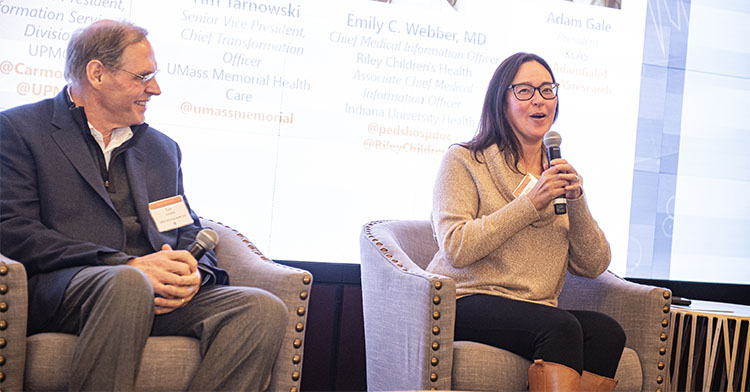Chief Medical Information Officer at Riley Children’s Health discusses importance of apps in the digital patient experience
Health care is making the digital patient experience a priority as providers look to drive satisfaction, access to care, and management of chronic conditions, among other goals.
“Digital tools are part of our patients’ expectations at this point,” said Emily C. Webber, MD, Chief Medical Information Officer (CMIO), Riley Children’s Health.
Dr. Webber was speaking to the Center for Connected Medicine (CCM) during the Top of Mind 2020 Summit about the role of digital tools, such as apps and telehealth platforms, for engaging with patients.
See two videos from the CCM’s interview with Dr. Webber below.
How is your health system implementing digital tools for patients?
It’s no secret that patients expect health systems to provide digital tools. One very helpful tool that Dr. Webber said has been implemented at her hospital is a wayfinding app. The wayfinding app helps visitors to the hospital easily figure out how to get to different places within a large and complex facility.
Riley Children’s also has a digital tool that it sends home with certain patients for remote monitoring of conditions. Dr. Webber described a platform loaded onto a tablet computer that is used to monitor babies with congenital heart disease at home.
“What we found is patients have greater confidence, and they feel more accessible to the medical team and vice versa,” Dr. Webber said. “It’s really made a huge difference.”
Earlier research on digital tools at health systems by the CCM found that improving access to care and enabling remote monitoring were two of the top goals driving the implementation of digital tools.
What health care data would make your job as a clinician easier?
Clinicians increasingly have valuable data at the point of care. Information such as recent lab results, radiology reports, and physician notes all aid in decision support, Dr. Webber said.
However, there is a “big gap” for clinicians and patients around the cost of care, she said. Having greater transparency into the price of common procedures, tests, and medications would be helpful to both patients and physicians, she said. With more information, patients and their doctors would be able to have more productive conversations about treatment and talk about options if cost is an issue.
“If I was going to pick something to prioritize being a standard, it would really be that cost of care,” Dr. Webber said.
Dr. Webber isn’t the only leader and innovator in health care pointing to greater price transparency as a need in health care. At CCM events, UnitedHealthcare Chief Information Officer Phil McKoy and Dr. Don Rucker, the National Coordinator for Health IT, have mentioned the value of bringing greater transparency to the cost of care.
A federal rule requiring hospitals and health insurers to publish their negotiated prices for hundreds of medical services was upheld by a federal judge after the American Hospital Association sued to block implementation of the rule. The AHA said it will appeal the rule, which goes into effect Jan. 1, 2021.
Learn more about Emily C. Webber MD
In addition to serving as CMIO at Riley Children’s Health, Dr. Webber is a pediatric hospitalist at Riley Hospital for Children and is Associate CMIO for Indiana University Health, the largest network of physicians in Indiana including 15 hospitals and dozens of outpatient locations.
She is also a practicing physician, board certified in pediatrics and clinical informatics, and is Associate Professor of Clinical Pediatrics at Indiana University School of Medicine.
Dr. Webber also has participated in other CCM events, including as a panelist for a roundtable discussion at the CCM in 2019 on interoperability of health care data.
More on digital health tools from the CCM
Watch our webinar on-demand and hear from health system and technology leaders about how providers are leveraging digital tools as in-person services expand.
Learn about how CCM partner UPMC ramped up telemedicine to address patient care during the pandemic.
And find out from a UPMC executive why health systems must prioritize the digital patient experience.



